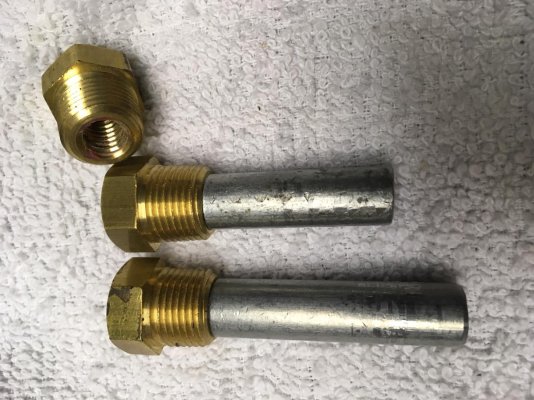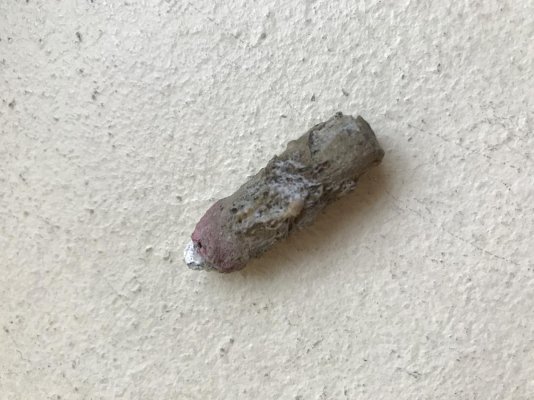You are using an out of date browser. It may not display this or other websites correctly.
You should upgrade or use an alternative browser.
You should upgrade or use an alternative browser.
Zinc Pencil
- Thread starter JudyP
- Start date
The friendliest place on the web for anyone who enjoys boating.
If you have answers, please help by responding to the unanswered posts.
If you have answers, please help by responding to the unanswered posts.
RT Firefly
Enigma
Greetings,
https://www.westmarine.com/buy/mart...-pencil-anodes--P004_122_002_006?recordNum=21
I don't know about the 90HP Lehmans but typically the heat exchanger will have one and possible the oil and transmission coolers They are hex head nuts that thread into larger hex head nuts usually on the bottom of the exchanger. Put a wrench on BOTH to unscrew. IF you only put a wrench on the smaller nut (anode holder) and twist, you may twist the housing (larger nut) off the body of the exchanger. Do NOT twist the larger nut. Brace it with a wrench and twist the smaller nut.
https://www.westmarine.com/buy/mart...-pencil-anodes--P004_122_002_006?recordNum=21
I don't know about the 90HP Lehmans but typically the heat exchanger will have one and possible the oil and transmission coolers They are hex head nuts that thread into larger hex head nuts usually on the bottom of the exchanger. Put a wrench on BOTH to unscrew. IF you only put a wrench on the smaller nut (anode holder) and twist, you may twist the housing (larger nut) off the body of the exchanger. Do NOT twist the larger nut. Brace it with a wrench and twist the smaller nut.
Judy
I'm going to guess with a home port of Toronto you are likely in fresh water.
Pencil Anodes or "Zincs" are available in different materials for different raw waters.
I'm in fresh water and use all Alum anodes - Magnesium or Alum recommended for fresh water and Zinc is only good in salt water.
I've had very good luck with Performance Metals pencil anodes and they are available in a wide variety of sizes. They have a steel core to the anode portion that helps prevent break-off of worn pencils
Performance Metals
I'm going to guess with a home port of Toronto you are likely in fresh water.
Pencil Anodes or "Zincs" are available in different materials for different raw waters.
I'm in fresh water and use all Alum anodes - Magnesium or Alum recommended for fresh water and Zinc is only good in salt water.
I've had very good luck with Performance Metals pencil anodes and they are available in a wide variety of sizes. They have a steel core to the anode portion that helps prevent break-off of worn pencils
Performance Metals
RT Firefly
Enigma
Greetings,
Mr. B. Excellent advice about the fresh water anodes. Completely slipped my feeble mind...

Mr. B. Excellent advice about the fresh water anodes. Completely slipped my feeble mind...

Comodave
Moderator Emeritus
- Joined
- Jul 2, 2015
- Messages
- 21,299
- Location
- Au Gres, MI
- Vessel Name
- Black Dog
- Vessel Make
- Formula 41PC
Did you try Brian at American Diesel? 804-435-3107.
American Diesel sells them. The zinc they currently supply needs to be cut down so it protrudes 1 1/2" below brass. (Middle object) Otherwise it will hit the internal tubes. Note some heat exchangers may have 2 zincs. Oil coolers may also have zincs as previously mentioned.
Attachments
- Joined
- Nov 8, 2012
- Messages
- 2,315
- Location
- USA
- Vessel Name
- Sandpiper
- Vessel Make
- Bluewater 40 Pilothouse Trawler
The Lehman oil and transmission coolers do not use zinc. The coolers are considered maintenance items and has a xxxx hour replacement schedule. I'm not on the boat so don't have the replacement schedule for copper and CuNi coolers.
The Lehman heat exchanger has a zinc. It can be purchased at any marine store. The zinc is a standard size that on some coolers require cutting short as above post references. The SeaKamp uses standard length zinc and the CuNi seem to have a longer life than some of the others.
The Lehman heat exchanger also has a replacement schedule.
The Lehman heat exchanger has a zinc. It can be purchased at any marine store. The zinc is a standard size that on some coolers require cutting short as above post references. The SeaKamp uses standard length zinc and the CuNi seem to have a longer life than some of the others.
The Lehman heat exchanger also has a replacement schedule.
- Joined
- Nov 8, 2012
- Messages
- 2,315
- Location
- USA
- Vessel Name
- Sandpiper
- Vessel Make
- Bluewater 40 Pilothouse Trawler
According to American Diesel, transmission and oil coolers are on a 1200 hour replacement schedule and the heat exchanger 2,000 hours.
Those are probably for copper.
I'm guessing 1800 hours for a CuNi oil/transmission cooler and 3,000 hours for a CuNi heat exchanger.
Those are probably for copper.
I'm guessing 1800 hours for a CuNi oil/transmission cooler and 3,000 hours for a CuNi heat exchanger.
Pete Meisinger
Guru
- Joined
- Oct 7, 2012
- Messages
- 3,145
- Location
- USA
- Vessel Name
- Best Alternative
- Vessel Make
- 36 Albin Aft Cabin
I am in fresh water, Lake Michigan. The zincs on the exterior of my boat have never shown any wear. In 8 years I never checked the engine or transmission zincs.
The engine zincs were no doubt replaced with the engine rebuild but not the transmission.
Guess I better take a look, eh?
pete
The engine zincs were no doubt replaced with the engine rebuild but not the transmission.
Guess I better take a look, eh?
pete
JudyP:
Looks like it was ready for replacement.
There is a bit of technique to replacing heat exchanger zincs. You want to replace them before they look like the one above as they are then prone to breaking off and getting stuck inside. A good rule of thumb is replace when 1/3 of the zinc is gone.
In salt water and in fresh it is probably quite a bit longer, zincs last from 6 mo to 2 years depending on whether the raw water drains out after shutdown.
Also when you put a new zinc on an existing brass nut, screw it down tight with pliers and wrench, otherwise it can back off when you unscrew the brass plug and fall off inside.
If one does break off, you can try to drill out the remaining zinc inside the plug but it is a PITA. It is probably easiest to replace the whole brass nut and zinc assembly.
David
Looks like it was ready for replacement.
There is a bit of technique to replacing heat exchanger zincs. You want to replace them before they look like the one above as they are then prone to breaking off and getting stuck inside. A good rule of thumb is replace when 1/3 of the zinc is gone.
In salt water and in fresh it is probably quite a bit longer, zincs last from 6 mo to 2 years depending on whether the raw water drains out after shutdown.
Also when you put a new zinc on an existing brass nut, screw it down tight with pliers and wrench, otherwise it can back off when you unscrew the brass plug and fall off inside.
If one does break off, you can try to drill out the remaining zinc inside the plug but it is a PITA. It is probably easiest to replace the whole brass nut and zinc assembly.
David
Last edited:
JudyP
Veteran Member
Thanks everyone. We had the heat exchanger off to replace the head gasket so this job was easy. I will be checking this more often now that I know the engine.and I can track running time. The PO did nothing to the motor thus the head gasket replacement.
firehoser75
Guru
- Joined
- Feb 18, 2018
- Messages
- 1,706
- Location
- Canada
- Vessel Name
- former owner of "Pilitak"
- Vessel Make
- Nordic Tug 37
My 2 cents worth for engine related anodes is to change them often, before they start to "disintegrate". Why, they are inexpensive (compared to other things), and the effort to change them is minimal (even for a DYIer). If left too long, they can break off or even earlier "shed" pieces that can contribute to "clogging" up the internal passages in your "cooling devices" resulting in the need to prematurely have to disassemble these coolers for servicing to avoid engine overheats. Way easier to just change the anodes (zincs) before this occurs.
Just pull them out regularly to check on their condition, and it will become apparent how often you should change them to avoid this issue. My advice, if in doubt, change them.
Just pull them out regularly to check on their condition, and it will become apparent how often you should change them to avoid this issue. My advice, if in doubt, change them.
I am in fresh water, Lake Michigan. The zincs on the exterior of my boat have never shown any wear. In 8 years I never checked the engine or transmission zincs.
The engine zincs were no doubt replaced with the engine rebuild but not the transmission.
Guess I better take a look, eh?
pete
Zincs in fresh water are ineffective, that’s probably why yours haven’t shown any wear. You should be using magnesium or aluminum anodes.
Comodave
Moderator Emeritus
- Joined
- Jul 2, 2015
- Messages
- 21,299
- Location
- Au Gres, MI
- Vessel Name
- Black Dog
- Vessel Make
- Formula 41PC
Zincs in fresh water are ineffective, that’s probably why yours haven’t shown any wear. You should be using magnesium or aluminum anodes.
You beat me to it, I was just going to say that.
Take a look back at post #3Zincs in fresh water are ineffective, that’s probably why yours haven’t shown any wear. You should be using magnesium or aluminum anodes.
I hoping the OPs new "zincs" are really alum or magnesium? If not the new ones won't be any more help than that old broken one removed?
Comodave
Moderator Emeritus
- Joined
- Jul 2, 2015
- Messages
- 21,299
- Location
- Au Gres, MI
- Vessel Name
- Black Dog
- Vessel Make
- Formula 41PC
They are properly anodes. Too many people refer to all anodes as zincs. That brings a lot of confusion into the discussion. If people would say anode or refer to them as aluminum anode, magnesium anode or zinc anode then there would be no confusion or at least less confusion.
firehoser75
Guru
- Joined
- Feb 18, 2018
- Messages
- 1,706
- Location
- Canada
- Vessel Name
- former owner of "Pilitak"
- Vessel Make
- Nordic Tug 37
+1 on that!They are properly anodes. Too many people refer to all anodes as zincs. That brings a lot of confusion into the discussion. If people would say anode or refer to them as aluminum anode, magnesium anode or zinc anode then there would be no confusion or at least less confusion.



